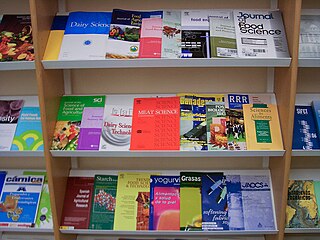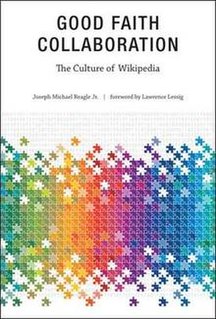Related Research Articles

An academic or scholarly journal is a periodical publication in which scholarship relating to a particular academic discipline is published. Academic journals serve as permanent and transparent forums for the presentation, scrutiny, and discussion of research. They are usually peer-reviewed or refereed. Content typically takes the form of articles presenting original research, review articles, and book reviews. The purpose of an academic journal, according to Henry Oldenburg, is to give researchers a venue to "impart their knowledge to one another, and contribute what they can to the Grand design of improving natural knowledge, and perfecting all Philosophical Arts, and Sciences."
The Association of College & Research Libraries defines information literacy as a "set of integrated abilities encompassing the reflective discovery of information, the understanding of how information is produced and valued and the use of information in creating new knowledge and participating ethically in communities of learning".
Visual rhetoric is the art of effective communication through visual elements such as images, typography, and texts. Visual rhetoric encompasses the skill of visual literacy and the ability to analyze images for their form and meaning. Drawing on techniques from semiotics and rhetorical analysis, visual rhetoric expands on visual literacy as it examines the structure of an image with the focus on its persuasive effects on an audience.
"The Death of the Author" is a 1967 essay by the French literary critic and theorist Roland Barthes (1915–1980). Barthes's essay argues against traditional literary criticism's practice of incorporating the intentions and biographical context of an author in an interpretation of a text, and instead argues that writing and creator are unrelated. The essay's first English-language publication was in the American journal Aspen, no. 5–6 in 1967; the French debut was in the magazine Manteia, no. 5 (1968). The essay later appeared in an anthology of Barthes's essays, Image-Music-Text (1977), a book that also included his "From Work To Text".
Computers and writing is a sub-field of college English studies whose members are dedicated to the academic study of how computers, as well as other, related digital technologies, affect literacy and the writing process. The range of inquiry in this field is quite broad and can include studies as diverse as works of video game theory to a quantitative study of first-year college students using Microsoft Word. Some frequently addressed topics include hypertext theory, visual rhetoric, multimedia authoring, distance learning, digital rhetoric, usability studies, the formation and lifecycles of online communities, and how various media change reading and writing practices, textual conventions, and genres. Other topics examine social or critical issues in computer technology and literacy, such as the issues of the "digital divide", equitable access to computer-writing resources, and critical technological literacies.

Henry Jenkins III is an American media scholar and Provost Professor of Communication, Journalism, and Cinematic Arts, a joint professorship at the University of Southern California (USC) Annenberg School for Communication and Journalism and the USC School of Cinematic Arts. He also has a joint faculty appointment with the USC Rossier School of Education. Previously, Jenkins was the Peter de Florez Professor of Humanities as well as co-founder and co-director of the Comparative Media Studies program at the Massachusetts Institute of Technology (MIT). He has also served on the technical advisory board at ZeniMax Media, parent company of video game publisher Bethesda Softworks. In 2013, he was appointed to the board that selects the prestigious Peabody Award winners.

Digital rhetoric is a way of informing, persuading, and inspiring action in an audience through digital media that is composed and distributed via multimedia platforms. Due to the increasingly mediated nature of our contemporary society, there are no longer clear distinctions between digital and non-digital environments. This has led to an expansion of the scope of digital rhetoric as there is a need to account for the increased fluidity with which humans interact with technology. Contrary to past conceptions, the definition of rhetoric can no longer be confined to simply the sending and receiving of messages to persuade or impart knowledge. While this represents a primarily ancient Western view of rhetoric, Arthur Smith of UCLA explains that the ancient rhetoric of many cultures, such as African rhetoric, existed independent of Western influence. Today, rhetoric encompasses all forms of discourse that serve any given purpose within specific contexts, while also simultaneously being shaped by those contexts.

Composition studies is the professional field of writing, research, and instruction, focusing especially on writing at the college level in the United States. The flagship national organization for this field is the Conference on College Composition and Communication.
Digital literacy refers to an individual's ability to find, evaluate, and compose clear information through writing and other media on various digital platforms. It is evaluated by an individual's grammar, composition, typing skills and ability to produce text, images, audio and designs using technology. The American Library Association (ALA) defines digital literacy as "the ability to use information and communication technologies to find, evaluate, create, and communicate information, requiring both cognitive and technical skills." While digital literacy initially focused on digital skills and stand-alone computers, the advent of the internet and use of social media, has caused some of its focus to shift to mobile devices. Similar to other expanding definitions of literacy that recognize cultural and historical ways of making meaning, digital literacy does not replace traditional forms of literacy, and instead builds upon and expands the skills that form the foundation of traditional forms of literacy. Digital literacy should be considered to be a part of the path to knowledge.
Electracy is a theory by Gregory Ulmer that describes the kind of skills and facility necessary to exploit the full communicative potential of new electronic media such as multimedia, hypermedia, social software, and virtual worlds. According to Ulmer, electracy "is to digital media what literacy is to print." It encompasses the broader cultural, institutional, pedagogical, and ideological implications inherent in the transition from a culture of print literacy to a culture saturated with electronic media. "Electracy" is the term he gives to what is resulting from this major transition that our society is undergoing. The term is a portmanteau word, combining "electrical" with "literacy", to allude to one of the fundamental terms used by the French philosopher Jacques Derrida to name the relational spacing that enables and delimits any signification in any medium.
Scholarly communication involves the creation, publication, dissemination and discovery of academic research, primarily in peer-reviewed journals and books. It is “the system through which research and other scholarly writings are created, evaluated for quality, disseminated to the scholarly community, and preserved for future use." This primarily involves the publication of peer-reviewed academic journals, books and conference papers.
Colin Lankshear is Adjunct Professor at James Cook University, Mount St Vincent University and McGill University. He is an internationally acclaimed scholar in the study of new literacies and digital technologies.

First-year composition is an introductory core curriculum writing course in US colleges and universities. This course focuses on improving students' abilities to write in a university setting and introduces students to writing practices in the disciplines and professions. These courses are traditionally required of incoming students, thus the previous name, "Freshman Composition." Scholars working within the field of composition-rhetoric often have teaching first-year composition (FYC) courses as the practical focus of their scholarly work.
Donna Alvermann is an American educator and researcher in the field of language and literacy education whose work focuses on adolescent literature in and out of the classroom, including multiliteracies, interaction with new media and digital literacy. She is currently the appointed Omar Clyde and Elizabeth Parr Aderhold Professor in Education, and an appointed University of Georgia distinguished research professor. She is a tenured professor of Language and Literacy Education at the University of Georgia.
The Journal of Documentation is a double-blind peer-reviewed academic journal covering theories, concepts, models, frameworks, and philosophies in information science. The journal publishes scholarly articles, research reports, and critical reviews.

A digital studio provides both a technology-equipped space and technological/rhetorical support to students working individually or in groups on a variety of digital projects, such as designing a web site, developing an electronic portfolio for a class, creating a blog, selecting images for a visual essay, or writing a script for a podcast.

Good Faith Collaboration: The Culture of Wikipedia is a 2010 book by Joseph M. Reagle Jr. that deals with the topic of Wikipedia and the Wikipedia community. The book was first published on August 27, 2010, through the MIT Press and has a foreword by Lawrence Lessig. The book is an ethnographic study of the history of Wikipedia, its real life and theoretical precursors, and its culture including its consensus and collaborative practices.
Multimodality is the application of multiple literacies within one medium. For example, understanding a televised weather forecast (medium) involves understanding spoken language, written language, weather specific language, geography, and symbols. Multiple literacies or "modes" contribute to an audience's understanding of a composition. Everything from the placement of images to the organization of the content to the method of delivery creates meaning. This is the result of a shift from isolated text being relied on as the primary source of communication, to the image being utilized more frequently in the digital age. Multimodality describes communication practices in terms of the textual, aural, linguistic, spatial, and visual resources used to compose messages.
Renee Hobbs is an American scholar and educator who works in the field of media literacy education. She is Professor of Communication Studies at the Harrington School of Communication and Media and founder of the Media Education Lab at the University of Rhode Island.
Feminist rhetoric is seen as the act of producing or the study of feminist discourses. According to Jacqueline Jones Royster, it is a fairly new field that works to bring the narrative of all demographics of women into the pedagogy of rhetoric. Scholars of feminist rhetoric seek to bring women and their stories into the history of rhetoric; combine issues in feminist and rhetoric theory; and produce rhetorical criticism from feminist perspectives, with the ultimate goal of elevating historically marginalized voices.
References
- ↑ "Computers and Composition Editorial Board" . Retrieved 7 May 2020.
- ↑ "Editorial Board". Writing Spaces. Retrieved 21 May 2016.
- ↑ Gaillet, Lynée Lewis (2012). "(Per)Forming Archival Research Methodologies". College Composition and Communication . 64 (1): 35–58. JSTOR 23264916.
- ↑ Purdy, James. "Ph.D." Duquesne University.
- ↑ Robinson, Julia (July 2013). "Book Review: The New Digital Scholar". Ariadne . 71.
- ↑ McKenna, Paul (2013). "The New Digital Scholar (review)". Canadian Journal of Information and Library Science . 37 (3).
- ↑ Bennett, Natalie (2014). "The New Digital Scholar (review)". Journal of Library Innovation . 5 (1).
- ↑ Eden, Bradford Lee (2015). "The Next Digital Scholar: A Fresh Approach to the Common Core State Standards in Research and Writing edited by James P. Purdy and Randall Mcclure". Public Services Quarterly. 11 (1): 41–42. doi:10.1080/15228959.2015.997173. ISSN 1522-8959. S2CID 54122931.
- ↑ "The Next Digital Scholar (review)". Kirkus Reviews . July 2014.
- ↑ Calvert, Philip (2015). "The Next Digital Scholar (review)". The Electronic Library . 33 (3): 605–606. doi:10.1108/EL-11-2014-0206. ISSN 0264-0473.
- ↑ Johnson, Wendell G. (2017). "The Future Scholar: Researching and Teaching the Frameworks for Writing and Information Literacy. Mcclure, Randall, and Purdy, James P. (Eds.). (review)". Public Services Quarterly. 13 (4): 273–274. doi:10.1080/15228959.2017.1376421. S2CID 196131332.